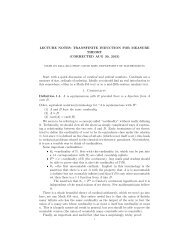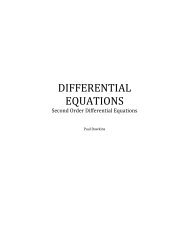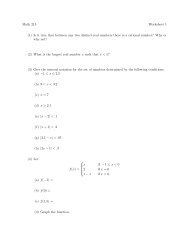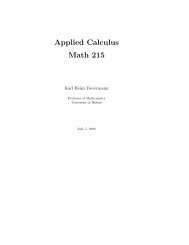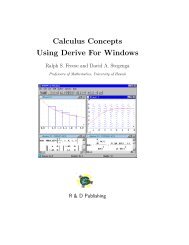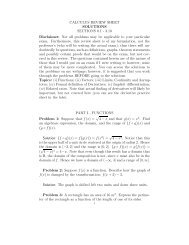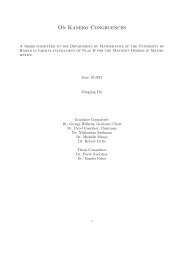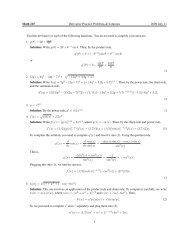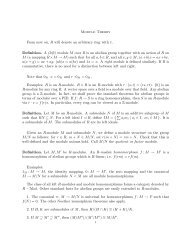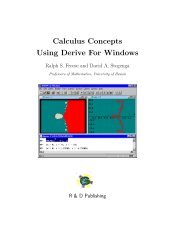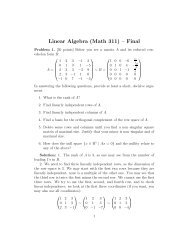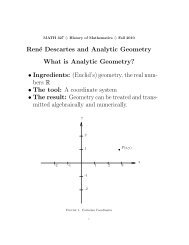Problems and Solutions in - Mathematics - University of Hawaii
Problems and Solutions in - Mathematics - University of Hawaii
Problems and Solutions in - Mathematics - University of Hawaii
Create successful ePaper yourself
Turn your PDF publications into a flip-book with our unique Google optimized e-Paper software.
1.6 2004 April 19 1 REAL ANALYSIS<br />
3. (a) Let S = [0, 1] <strong>and</strong> let {fn} ⊂ Lp (S), where 1 < p < ∞. Suppose that fn → f a.e. on S, where f ∈ Lp (S). If<br />
there is a constant M such that fnp ≤ M for all n, prove that for each g ∈ Lq (S), 1 1<br />
p + q = 1, we have<br />
<br />
lim<br />
n→∞<br />
fng =<br />
S<br />
fg.<br />
S<br />
(b) Show by means <strong>of</strong> an example that this result is false for p = 1.<br />
Solution:<br />
(a) S<strong>in</strong>ce g ∈ Lq (S), for all ɛ > 0 there exists δ > 0 such that if A is a measurable set with µA < δ then<br />
<br />
|g| q dµ < ɛ.<br />
A<br />
Let B0 ⊂ S denote the set on which fn does not converge to f. Let B ⊂ S be such that fn → f uniformly <strong>in</strong><br />
S \ B, <strong>and</strong> such that µB < δ. (Such a set exists by Egor<strong>of</strong>f’s theorem s<strong>in</strong>ce µS < ∞.) Now throw the set B0 <strong>in</strong><br />
with B (i.e. redef<strong>in</strong>e B to be B ∪ B0). Then,<br />
<br />
<br />
Dn := |fng − fg| dµ = |fn − f||g| dµ<br />
S <br />
S<br />
=<br />
|fn − f||g| dµ +<br />
S\B<br />
|fn − f||g| dµ<br />
B<br />
≤ (fn − f)χ S\Bpgq + fn − fpgχBq.<br />
The f<strong>in</strong>al <strong>in</strong>equality holds because fn, f ∈ L p implies |fn − f| ∈ L p <strong>and</strong> by Hölder’s <strong>in</strong>equality. Now, by<br />
M<strong>in</strong>kowski’s <strong>in</strong>equality, fn − fp ≤ fnp + fp, so<br />
Dn ≤ sup{|fn(x) − f(x)| : x /∈ B}µ(S \ B) 1/p <br />
gq + (fnp + fp) |g|<br />
B<br />
q 1/q dµ .<br />
Now we are free to choose the δ > 0 above so that<br />
<br />
|g|<br />
B<br />
q dµ<br />
1/q<br />
<<br />
ɛ<br />
2(M + fp)<br />
holds whenever µB < δ. Also, fn → f uniformly on S \ B, so let N be such that<br />
ɛ<br />
sup{|fN(x) − f(x)| : x /∈ B} <<br />
2µ(S \ B) 1/p .<br />
gq<br />
Then DN < ɛ/2 + ɛ/2. ⊓⊔<br />
(b) The result is not true for p = 1 as the follow<strong>in</strong>g example shows: Let fn = nχ [0,1/n], n = 1, 2, . . . . First note<br />
that fn → 0 a.e. For if x ∈ (0, 1], there exists N > 0 such that 1/N < x <strong>and</strong> thus fn(x) = 0 for all n ≥ N.<br />
Therefore, {x ∈ [0, 1] : fn(x) 0} = {0}. Now, if g is the constant function g ≡ 1, then fng dµ = 1 for all<br />
n = 1, 2, . . . . Therefore, fng dµ → 1, while fg dµ = 0g dµ = 0. F<strong>in</strong>ally, note that fn1 = nµ([0, 1<br />
n ]) = 1<br />
for n = 1, 2, . . . , so {fn} satisfies the hypothesis fn1 ≤ some constant M. ⊓⊔<br />
30




